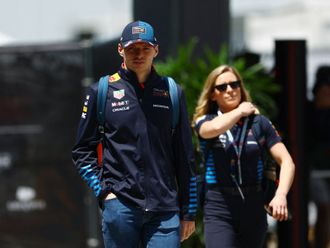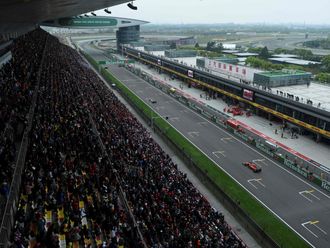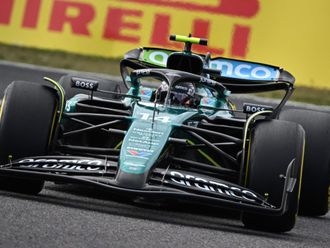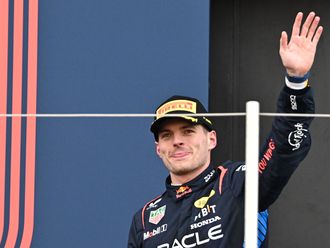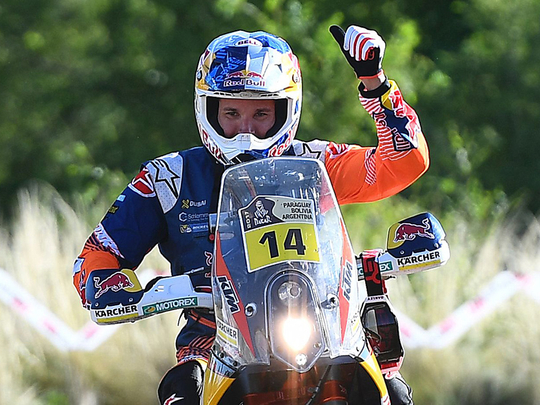
Dubai: Newly-crowned Dakar Rally champion Sam Sunderland, based in Dubai, hopes to become a regular winner of motorsport’s toughest off-road race after claiming his first victory in the motorbikes category on Saturday.
The 27-year-old, who rides for Red Bull KTM, became the annual event’s first British winner when he traversed the 12-stage, 8,782-km race from Paraguay to Argentina via Bolivia, from January 2-14, in 36 hours, six minutes and 22 seconds — 32 minutes ahead of his nearest rival.
It was his third attempt at the title having withdrawn with mechanical problems in 2012 and 2014, and now he has won it in his first completion. In 2014 he showed signs of his promise when he became the first Briton to win a stage in the Dakar Rally since 1998, before retiring.
“It’s human nature to want to keep winning and I want to get a few more that’s for sure,” he told Gulf News on his arrival back in Dubai on Tuesday.
“It’s tough to say if I can do that, as there are so many factors that you need to fall in your favour, from mechanics, injuries and navigation.
“So many things can happen, but yes, if you have done it once, there is nothing to say you can’t do it again, and the more you prepare for any situation, the better chance you’ll stand.
“This is something I’ve been working towards for the last six or seven years,” said Sunderland, who is originally from Poole in Dorset, Southern England, but moved to Dubai when he was 19 and made his Dakar debut aged 23.
“I’ve wanted to win more than anything, and I’ve worked hard at it every day to make myself as best prepared as I could. Now to be able to realise this dream, given all the hard work and sacrifice, is amazing.
“I started off wanting to win a stage in a normal rally, then I wanted to win a rally, then it was about winning a stage in the Dakar, and then when I did that in 2014, I could dream about winning the actual race, now I’ve done that, the expectation gets bigger.”
After breaking his femur last year, he was left with one leg longer than the other, and was told his right leg would never be fully functional again.
“I’ve had a lot of ups and downs, with a lot of injuries and I’ve had to pick myself up, train again and get ready, so to come back from that and win is unreal, it’s the biggest race in my sport and a mad adventure at the same time.”
Since its 1979 inception, there have been 28 deaths in the Dakar Rally and most of them have been motorcyclists. The average rate of completion is only 50 per cent. Originally held from Paris to Dakar, it moved to South America in 2009 due to security fears in North Africa.
“It’s really tough, it went from 45 degrees Celsius and really humid in Paraguay, to two degrees at 4,000-metres in Bolivia, back to 45 degrees in Argentina. You’re on the bike for 12-15 hours a day, across all temperatures, altitude and terrains and the risk is huge. There was a lot of pressure from leading the race as well,” added Sunderland, who took the lead and held it from stage five of 12.
“It hasn’t really sunk in yet, I know what I’ve done, but I don’t really feel it in my heart at the moment, I haven’t had the chance to sit down and think about it.”
The five-stage FIM Cross Country Rallies World Championship kicks-off again in Abu Dhabi from April.
“So there’s not much time to take it all in and enjoy it, I’ve finished second in the world championships for the past two years running and I missed out by a mere point or so last year, but Dakar is the big one, it’s like the Olympics of our sport.”
It costs a minimum of $75,000 (Dh275,475) for a motorcyclist to participate in the Dakar Rally, and even if you win, you get $50,000 in prize money, making the event mostly about prestige.
That said, victory is vital exposure for manufacturers and sponsors and Sunderland, who is on a professional full-time contract and financed by Red Bull KTM, can expect better rewards internally from his team, and externally through sponsors and endorsements.


